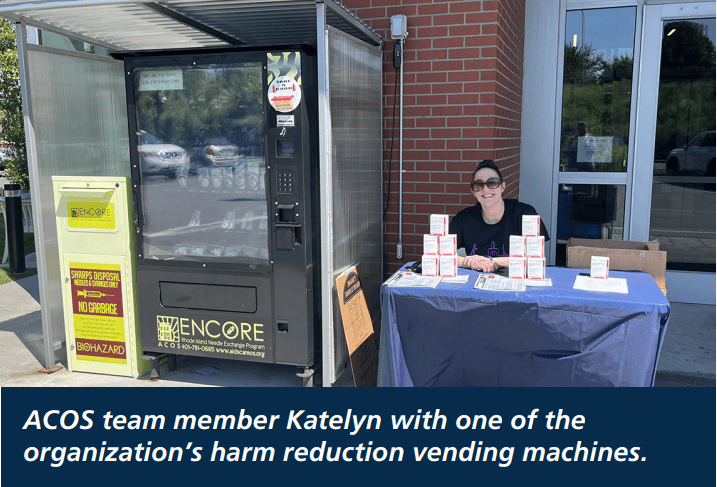Note: This page displays data from RIDOH-funded harm reduction organizations in the state.
Note: Harm reduction data was standardized across RIDOH-funded harm reduction organizations in 2021. RIDOH-funded harm reduction organizations send data to RIDOH monthly.
Note: The RIDOH data hub harm reduction page is updated quarterly.
Harm reduction is a top priority for Rhode Island’s overdose response.
Harm reduction is an evidence-based public health approach. It aims to provide tools, services, and education to keep people who use substances safer. Harm reduction organizations do this by giving supplies like naloxone, fentanyl test strips, and sterile needles to protect people from infections and overdose. Staff are trained to take a non-stigmatizing, person-centered approach. They connect people to basic needs like food, healthcare, housing, and peer-to-peer services.
Community Spotlight: AIDS Care Ocean State
Read a community spotlight with Ray Joseph, prevention supervisor for AIDS Care Ocean State (ACOS), about the agency’s harm reduction efforts and how ACOS helps reach all Rhode Islanders living with or affected by HIV, AIDS, and hepatitis C.
The need for harm reduction services is going up.
Our goal is to increase and diversify harm reduction resources across the state. These services help prevent infections and overdoses. They also connect people to supportive and health-based services.
When someone connects with a community-based organization for the first time, they are called a unique client. Unique clients are individuals served. This graph tracks the total number of unique clients over time. Each time a unique client connects with the community-based organization for supplies or support, it is called an encounter. Encounters help us know how often unique clients get services.
Black and Hispanic Rhode Islanders are impacted most by the overdose crisis.
This graph tracks the number of unique clients connected to harm reduction services by race and ethnicity. The number of non-Hispanic Black clients connecting to harm reduction services is the highest since early 2021. Overdose death rates are rising rapidly among Black and Hispanic Rhode Islanders. We are doing more work to connect Black and Hispanic communities to harm reduction services.
These patterns happen across our medical systems because of systemic racism. Racism is when people are discriminated against and treated differently based on their racial or ethnic background. This affects people’s ability to get a good house, job, and healthcare. We call this systemic racism because it affects every aspect of their life. As a result, this can put someone at a higher risk of overdose.
Fentanyl test strips are an important tool to prevent overdose.
Fentanyl test strips are a simple test someone can use on their drugs to check for fentanyl. When someone knows fentanyl is in their drugs, they can make choices to protect themselves. They might use less, go slower, or use with someone nearby who has naloxone.
Using fentanyl test strips can help prevent overdose for people who do not expect fentanyl in their drugs, like people who use cocaine or crack. Fentanyl test strips have been legal in Rhode Island since 2018. Since then, community organizations have been distributing fentanyl test strips around the state.
People without housing are at high risk of overdose.
One group of people who are at a higher risk of overdose are people without stable housing. This could mean they are staying outside or in a tent, living in a shelter or motel, or in a car.
Harm reduction organizations can be a big help to people who are unstably housed. They can provide basic needs and harm reduction services. They can also be a bridge to other organizations that help people find more stable housing options.

